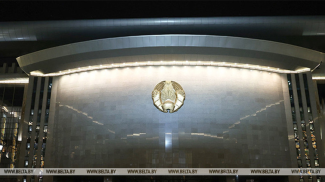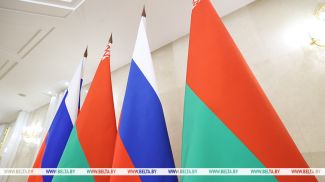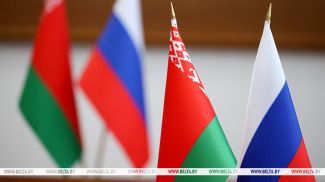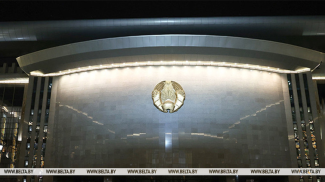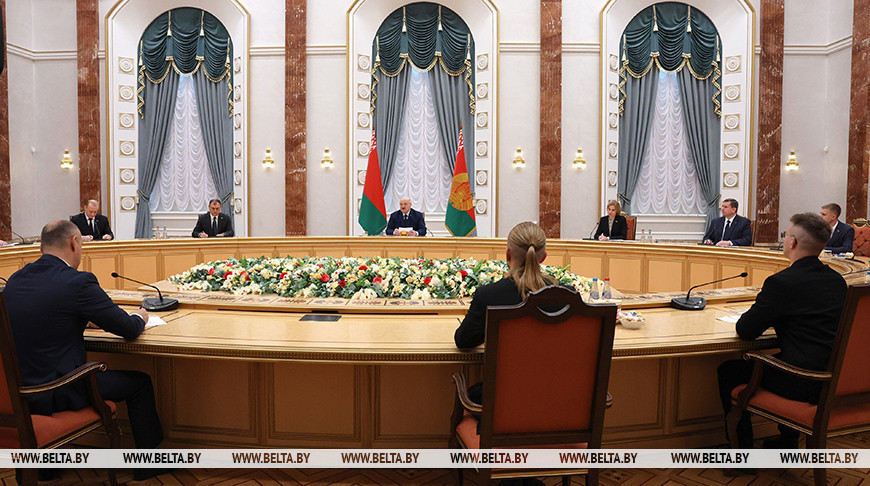
MINSK, 17 October (BelTA) – At the very beginning of the meeting with scientists and polar explorers on 17 October, Belarusian President Aleksandr Lukashenko explained why the research in Antarctica is so important, BelTA has learned.
“Our country needs this research. What practical results can we expect from it in the near future?” the Belarusian leader asked .
The head of state also asked about prospects of commercializing the presented technical solutions.
Aleksei Gaidashov, Deputy Head of the National Center for Polar Research and head of all Belarusian Antarctic expeditions, told the president that sophisticated devices are being tested in the unique conditions of Antarctica, many of which are better than foreign analogues, and some have no analogues in the world at all.
The head of state was shown a complex for recording geophysical signals, a MARS-B spectrometer, a submersible photometer, a solar spectral albedometer, a complex of mobile meteorological stations, a submersible bathyscaphe, a component base of a lidar and other equipment.
Aleksandr Lukashenko was also presented with minerals and components from Antarctica, samples of flora and fauna and other items obtained during polar research.
Aleksandr Lukashenko once again emphasized that he wants polar research not only to benefit fundamental science, but also to bring some practical results. “There should be appreciable results. We are not Americans or even Russians who have huge financial resources. They can finance projects that will pay off only in 100 years. Maybe we should also consider some projects that are a long shot, I don't want to hold you back. Yet, today we need results. Considerable financial and human resources are invested in it. There should be progress. I will tell you fair and square: the results of your work should be palpable. It should not be just about talking and mutual back-patting.”
The head of state asked what Belarusian polar explorers dream about from the perspective of the interests of the state. Responding to this question, Head of the National Center for Polar Research Vladimir Ryzhikov noted that the Belarusian station and the geography of research reflect the scientific interests of the country, and research outputs are already used in the pharmaceutical industry and microbiology. Recently, Antarctic tourism has been gaining popularity, and this already amounts to tens of thousands of tourists, which brings money to those countries that run such tours. Belarus is not yet involved in such activities, but considers this area as one of the promising ones.
In addition, a fierce struggle for the continent may unfold between world players in the future, and it is necessary to make sure that Belarus will not be sidelined during this struggle.
In general, the work of Belarusian polar explorers is still largely considered as investment into the future that will help the country to stay up to date with major trends in global scientific research and maintain a certain image of Belarus internationally.
In this regard, the head of state pointed out that space exploration was once a similar image project. Belarus has large enterprises that are working on the development of artificial Earth satellites. “That is why I viewed space as an image project. At the same time, I kept in mind that these enterprises should have work, people should have their jobs,” Aleksandr Lukashenko remarked.
The same applies to the construction of the nuclear power plant in Belarus, which, in addition to image, also brought practical benefits.
In other words, the state will continue to support the work of polar explorers, but there should be no misrepresentation of results. And it is important to make sure that 'fundamentalism develops into some kind of practicality'. “I do not have any kind of megalomania, but if we are already on it, it should be clear to the country that we will get something from it. Preferably something that will make our lives better. It's true, we must think about the future. I keep reiterating this. But to have a good future, we should proceed from the realities of today. And this is what I want to draw your attention to. I address this mostly to the Academy of Sciences and our scientists. Without scientists, we cannot move forward. But our scientists have mostly become rigid,” the Belarusian leader emphasized.
At the meeting, the cooperation of Belarusian polar explorers with their colleagues from Russia was praised. “I want to say thanks to them. You probably feel this truly brotherly hand,” the head of state noted.
In connection with the upcoming 17th Antarctic expedition, Aleksandr Lukashenko asked Aleksei Gaidashov whether the polar explorers have everything they need for the expedition. “You should be equipped as well as the Americans there. And if I have such an opportunity, I will be happy to travel there. I would gladly see this place. It's better to see it once with your own eyes than to hear about it multiple times,” the president said.
“It's good that you, your family and friends feel safe. This is the matter of my concern and my responsibility, as well as the duty of the government and the vertical of power. We will make sure that you will be able to continue your peaceful fight on the scientific front. But I ask you to promise that your research will be useful. There should be tangible results from your activities,” Aleksandr Lukashenko remarked.
He thanked the researchers and polar explorers for their work and urged them not to be offended by the harsh tone: “You know the situation we live in. Although you are far away from us during the season, you know the situation in the country and you also know that things are not easy now. Therefore, your promises to produce results tomorrow... We need them today! You should show them tomorrow. The day after tomorrow will be too late. Therefore, we must stop just talking the talk. You should take action, it bears underscoring.”
By decision of the president, in 2006 Belarus joined the Antarctic Treaty and since that time it has been actively involved in research in this region. About 70 scientific stations from 30 countries are located in Antarctica, including the Belarusian Antarctic station Mount Vechernyaya. Since 2006, Belarus has sent 16 expeditions to Antarctica. A total of 51 Belarusian scientists and specialists took part in them; 22 people participated in these expeditions two or more times.
The outcomes of the research conducted in Antarctica are unique and fundamentally important, since the processes occurring on this continent largely reflect the dynamics of climate change on the planet and affect the conservation of biodiversity.






